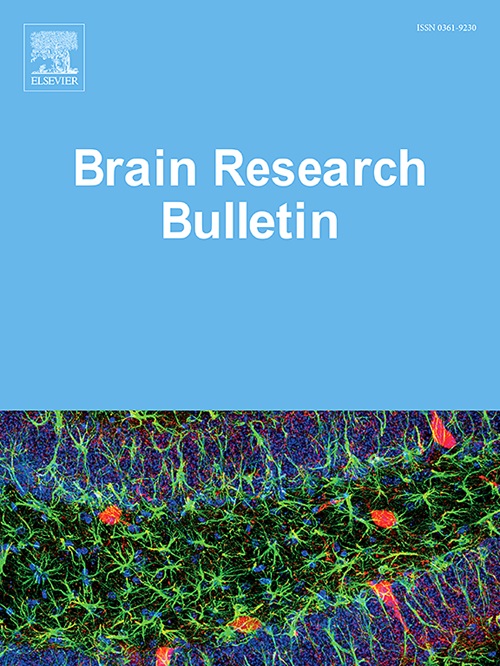脑源性神经营养因子基因多态性差异影响脑卒中后言语和语言表现及恢复。
IF 3.7
3区 医学
Q2 NEUROSCIENCES
引用次数: 0
摘要
背景:中风是世界范围内导致长期残疾的主要原因,对许多大脑功能,如言语和语言产生不利影响。关于基因在中风恢复中的作用的数据是缺乏的。脑源性神经营养因子(BDNF)是一种神经营养因子,被证明与中风恢复有关。BDNF基因中的单核苷酸多态性(SNP)被证明影响其释放和功能。关于这种SNP对中风后言语和语言恢复的影响的数据仍然缺乏。目的:探讨脑源性神经营养因子(BDNF)基因多态性在脑卒中后言语和语言表现及康复反应中的作用。方法:招募到阿卜杜拉国王大学医院语言康复门诊就诊的语言障碍患者。进行了基线语音和语言评估,随后进行了康复计划。此外,获得血液样本进行BDNF基因分型。结果:32例患者参与本研究,其中12例(37.5%)为metBDNF基因型。metBDNF基因型患者在基线时的语言表现明显较低(23.3 Vs. 8.5;p=0.022),对康复计划的反应较低(31.4 Vs. 39.1, p=0.032)。此外,BDNF基因型被确定为基线言语表现的独立预测因子。语言基线表现和康复反应不受BDNF基因型的影响。结论:BDNF基因型对脑卒中后语言表现和恢复有不同的影响。本文章由计算机程序翻译,如有差异,请以英文原文为准。
Brain-derived neurotrophic factor gene polymorphism differentially affects speech and language performance and recovery after stroke
Background
Stroke is the leading cause of long-term disability worldwide, with detrimental effects on many brain functions, such as speech and language. Data regarding the role of genetics in stroke recovery is lacking. Brain-derived neurotrophic factor (BDNF) is a neurotrophin that was shown to be involved in stroke recovery. A single nucleotide polymorphism (SNP) in the BDNF gene was shown to affect its release and function. Data regarding the effect of this SNP on speech and language recovery after stroke is still lacking.
Objective
This study assesses the role of BDNF gene polymorphism in speech and language performance and response to rehabilitation after stroke.
Methods
patients with speech and language deficits referred to the speech and language rehabilitation clinic at King Abdullah University Hospital were recruited. A baseline speech and language assessment was performed, followed by a rehabilitation program. Additionally, a blood sample was obtained for BDNF genotyping.
Results
Thirty-two patients participated in this study, with 12 patients (37.5 %) having the metBDNF genotype. Patients with metBDNF genotype had significantly lower speech performance at baseline (23.3 Vs. 8.5; p = 0.022) and lower response to the rehabilitation program (31.4 Vs. 39.1, p = 0.032). Furthermore, the BDNF genotype was identified as an independent predictor of baseline speech performance. Language baseline performance and response to rehabilitation were not affected by the BDNF genotype.
Conclusion
The results indicate a differential effect of BDNF genotype on speech performance and recovery after stroke.
求助全文
通过发布文献求助,成功后即可免费获取论文全文。
去求助
来源期刊

Brain Research Bulletin
医学-神经科学
CiteScore
6.90
自引率
2.60%
发文量
253
审稿时长
67 days
期刊介绍:
The Brain Research Bulletin (BRB) aims to publish novel work that advances our knowledge of molecular and cellular mechanisms that underlie neural network properties associated with behavior, cognition and other brain functions during neurodevelopment and in the adult. Although clinical research is out of the Journal''s scope, the BRB also aims to publish translation research that provides insight into biological mechanisms and processes associated with neurodegeneration mechanisms, neurological diseases and neuropsychiatric disorders. The Journal is especially interested in research using novel methodologies, such as optogenetics, multielectrode array recordings and life imaging in wild-type and genetically-modified animal models, with the goal to advance our understanding of how neurons, glia and networks function in vivo.
 求助内容:
求助内容: 应助结果提醒方式:
应助结果提醒方式:


